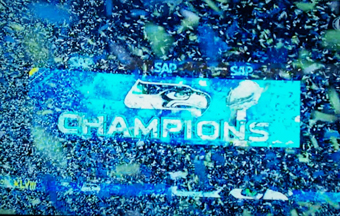
Super Bowl, Super Blowout
By R. Alan Clanton | Published, Monday, February 3, 2014 |
Thursday Review editor
To judge from some of the remarks making the rounds on Facebook, Twitter and Google+, Super Bowl XLVIII had become Super Bore within the first 15 minutes of regular play. Still, viewership was higher than ever, and Sunday's event may have been the most watched television event in U.S. history. Nielson overnight ratings conducted after the game and through the next morning showed that approximately 111.5 million tuned-in to watch the game.
But Seattle fans had a lot to celebrate on Sunday, and for them the 2014 Super Bowl was an epic success. The Seahawks exploited a botched snap on the first regular play of the game, when only 12 seconds into the big game Denver’s Peyton Manning stepped slightly out of position a fraction of a second before the ball was hiked.
The result was a football which sailed inexplicably over Manning’s shoulder and into the end zone. Two points: Seattle.
If ever there was a bad omen—illuminated large in the look of Manning’s eyes as that first snap drifted aimlessly, wobbling across his right shoulder—that miscommunication set tone and mood for the rest of the game. Denver never got a grip, and Seattle never looked back. The final score was 43-8.
It became the third most lopsided Super Bowl in pro football history, rivaling only San Francisco’s similar rout over Denver in the Superdome in New Orleans in 1990 (by a score of 55 to 10), and the Chicago Bear’s drubbing of the New England Patriots back in 1986 at Super Bowl XX.
That means that San Francisco still holds the record for the biggest Super Bowl scoring disparity when Joe Montana led the 49ers to that infamous 35 point margin over Denver in Super Bowl XXIV, the only game in which the Broncos were buried under more rubble.
This year, Seattle players made their rout over Denver look almost as easy as that day in 1990 when Montana’s passing arm sliced through Denver’s defense with deadly precision. Seattle also achieved a rare first half shutout, from which, one would have expected, Denver might have come onto the field after halftime refreshed, determined, and primed to change the momentum. There would be no such outcome: Denver scored only once, and, after adding a two-point conversion, had earned the only points they would take away from the game.
One could reasonably argue that the game was Denver’s to win or lose, but most who watched the game agree that Seattle won on the merits of their own strengths, not by simply exploiting Denver’s several critical mistakes. Denver had plenty of opportunities to turn things around during the first quarter, and indeed numerous Super Bowls have been won by teams who came back from worse early deficits. But after Seattle’s Malcolm Smith intercepted a Manning pass later in the first half and ran in it for another touchdown, Denver was scoreless at the end of the first half—and down by a whopping 22 points.
On Facebook and Twitter the talk quickly turned from the football to the commercials, a bad sign for the action on the field even before halftime, but a worse omen for the advertisers who had spent untold millions for ads deeper into the second half. Eventually even online chatter about ads tapered off as millions of viewers began to drift away from their televisions despite the big-budget ads.
But to judge from social media, Seattle fans stayed right in front of televisions in homes, at parties, and in bars and pubs, savoring the moment and sharing the warm light of the Seahawk’s well-deserved big win.
For Thursday Review readers in the Pacific Northwest, it was an epic blowout for the navy blue, luminous green and battleship grey.
